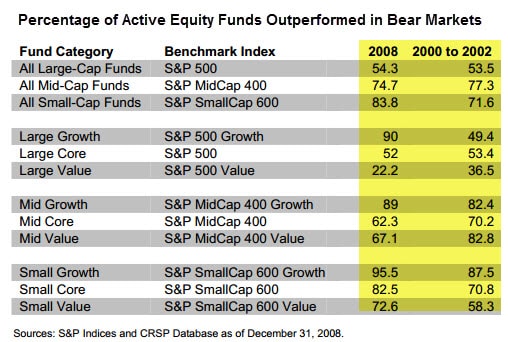Isn’t it more than ironic that of all the times stock picking fund managers would post their worst multi-decade performance – that it would be smack dab in the middle of a raging bull market?
Never mind how the S&P 500 (SNP:^GSPC) is about to record its fifth consecutive yearly gain and ninth gain out of the past 10 years. Even with the wind in their sails, professional stock pickers still can’t beat market indexes or the ETFs tracking them.
According to Lipper, around 85% of active large cap stock funds have lagged their yardsticks this year and it’s their worst showing in three decades. If professional stock pickers are collectively this bad during a good stock market, how bad are they during a bad market? I decided to find out.
(Audio) Crash Course in How to Build an Investment Portfolio
The 2008 bear market was the worst year for stocks since 1931. Yet, historical data from Standard & Poor’s shows us the S&P 500 (NYSEARCA:VOO) still beat 54.3% of actively managed large cap funds, the S&P Mid Cap 400 (NYSEARCA:MDY) beat 74.7% of actively managed mid cap funds, and the S&P Small Cap 600 (NYSEARCA:IJR) beat 83.8% of actively managed small cap funds. In each instance, the statistical odds favored the index investor.
What about the bear market during 2000-02? Were the historical results any different?
During the 2000-02 bear market, the S&P 500 outperformed 53.5% of actively managed large cap funds, the S&P Mid Cap 400 beat 77.3% of actively managed mid cap funds, and the S&P Small Cap 600 outperformed 71.6% of actively managed small cap mutual funds.
A few things to keep in mind about this historical data:
- S&P index linked ETFs easily beat active managers during both the 2008 and 2000-02 bear market despite the distinct disadvantage of being forced to remain fully invested at all times;
- S&P index linked ETFs are outperforming active managers during all types of market cycles (bull and bear);
- S&P index linked ETFs are delivering outperformance with substantially lower fees and better tax-efficiency vs. active funds;
- Historical data does not support the myth that so-called “inefficiencies” in mid and small cap equity markets favor active managers.
What To Do
None of this disproves the existence of stock pickers that do outperform. Some do, but most don’t. The margin of victory is often so small, the risks taken to achieve it simply aren’t worth it. Furthermore, the winning streak for managers that do outperform is characteristically short-lived.
Here’s the other problem: Pre-identifying the fund managers that will outperform in the future is like trying to guess which lottery numbers will become tomorrow’s winners. It’s a loser’s game, which means the only way you can win is by 1) not playing the game at all, or 2) playing the game according established rules that favor your odds of success.
The better portfolio building approach is to build the core or foundation of your portfolio around diversified low cost index ETFs that hit the four major asset classes; stocks, bonds (NYSEARCA:AGG), commodities (NYSEARCA:GCC), and real estate (NYSEARCA:VNQI). And whatever play money you have left over after you’ve first built your portfolio’s core can be designated for non-core assets like actively managed funds.
Setting up your portfolio to outperform the bulk of active stock pickers is still a winning strategy.
Follow us on Twitter @ ETFguide
